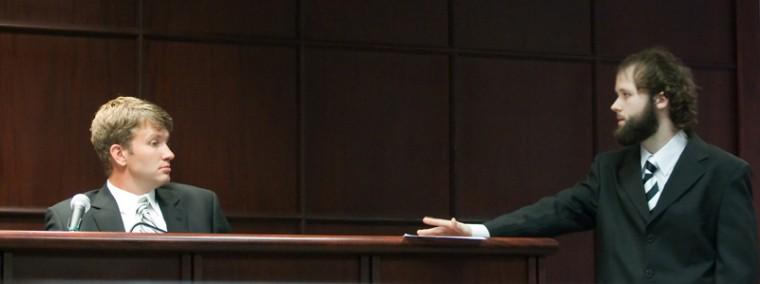Bleary-eyed students and faculty dressed in business attire gathered in courtroom 9C of the Wake County Courthouse June 25 at 9 a.m. to act and produce “The Case of the Sleazy Spouse,” a mock court case focused on business partnerships and the law.
Dr. Ron Campbell, an instructor in the agriculture and resource economics department, emailed a script two weeks before filming to students in his Distance Education business law class. The performers were all volunteers, and while some knew what part they wanted to play, Campbell said some did not want to get stuck with learning lines.
“‘The Case of the Sleazy Spouse’ deals with the issue of partners and what happens when one of them in apparently good health, only 30 years old, is killed outright in an automobile accident. They have not purchased life insurance, they have not prepared a partnership agreement, they have not done business life insurance and just four hours before the fatal accident, [one of the partners] got married,” Campbell said.
The dead partner’s husband of only a few hours takes to the witness stand to plead for “his share” of half his wife’s business, while the other business partner and his lawyers try to convince the jury the spouse does not deserve any of the profits.
“So the question for the viewers is whether or not this spouse, the sleazy spouse–sort of an undereducated person of low aspirations; a gigolo–is this person entitled to the business that suddenly became monumentally successful? And, as the only heir of his wife of four hours, is he entitled to half the business?” Campbell asked.
If people would like to know the answers, they will not find them in the video, which runs about 14 minutes and is posted to Dr. Campbell’s website, www.agbusinesslaw.ncsu.edu. Campbell said people will be able to email him to find out who actually prevails.
“This will be online, and when my students study business partnerships, we’re going to talk about this. I’m not going to give the students the answers, but they will know and they will know with confidence,” Campbell said. “It is a real situation that I had as an attorney; I practiced as a trial attorney in Raleigh for 16 years and now I’m retired. When I teach about partnerships in my business law class, all my students learn about preparing a partnership agreement and how easy it is.”
Andrew Cagle, a senior in agricultural business management, portrayed the role of Lawyer Denton, who worked on the side of the living business partner. Cagle said he came to the courthouse straight from class and was the last one to arrive on set.
“I didn’t know which lawyer I was until I came in and [Campbell asked] which one I was,” Cagle said.
Laura Johnson, a junior in extension education, played the presiding Judge Marshall–and even got to wear a black robe and color part of her hair with gray makeup.
“I didn’t have a whole lot of options about my role, but it’s fun, a new experience,” Johnson said. “This is the first I’ve heard about [the case].”
Dustin Reaves, a junior in agricultural and environmental technology, acted as the jury foreperson, or the person who reads the verdict, in the film.
“We came once to the court house before and viewed Small Claims Civil Courts cases and then I came back for [the film]. I thought it was interesting, to see how things work out,” Reaves said of the Distance Education class he took with Dr. Campbell this summer.
As for the mock case, Reaves said he found it funny.
“It’s got a little bit of comedy to it. I don’t really think it would stand up that well in a regular court of law, but as far as everything goes, it’ll be good for students to watch and get an idea of how a real court case is handled,” Reaves said. “I actually don’t know the verdict, but I’m interested to find out.”
Cagle has taken three agricultural law classes with Dr. Campbell, and therefore knows who won in the actual court case.
“Anytime you get to work on a project with Dr. Campbell, you learn a lot and you meet a lot of people. Campbell is Campbell–he’s a lot of fun,” Cagle said. “After sitting through his classes three times, it’s kind of ingrained in our head who actually won the case.”
Campbell said he was lucky enough to land an actual courtroom for the movie set because of Chief Judge Robert Rader, who said the courtroom would be free during the annual judge’s conference. Judge Dexter Williams, who Campbell said is the Chief Magistrate and has been in charge of the Small Claims Court in Wake County for 26 years, joined the cast and crew for lunch.
The director and producer, Larry Evans of the DELTA Department of Distance Education, operated the sound, camera and lighting while giving direction to the actors. The filming lasted all day, with each scene requiring a master shot and close-ups of the actors involved.








